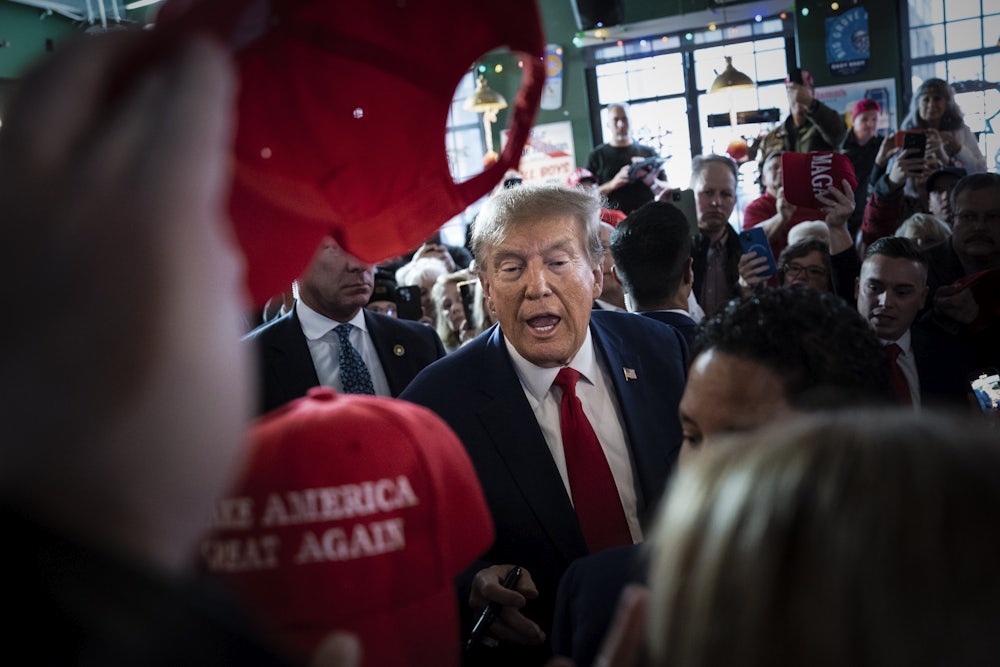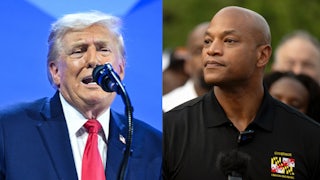I still can’t bring myself to believe that Donald Trump, the Queens-born proto-fascist who blundered his way into the presidency in 2016, will again be elected president in 2024. But his nomination by a nihilist Republican Party seems all but certain, and polls now show him in a dead heat with or even a little ahead of President Joe Biden. And though I continue to disapprove of The Atlantic’s panic-porn propensity to declare democracy doomed at every opportunity, I can’t quarrel with its January/February issue explaining why a second Trump term would be a catastrophe.
It would absolutely be a catastrophe, and by now even my complacent self is starting to wonder how to make Trump go away. We’ve tried voting against him. We’ve tried prosecuting him for crimes, both in and out of office, to which he’s on record confessing even as he pleads not guilty. Now I propose we take a leaf from the great labor organizer Cesar Chavez and reconceive Donald Trump as, well, a grape. Let’s boycott the son of a bitch.
“We have,” writes David Frum,
a fair idea of a second Trump administration’s immediate priorities: (1) Stop all federal and state cases against Trump, criminal and civil. (2) Pardon and protect those who tried to overturn the 2020 election on Trump’s behalf. (3) Send the Department of Justice into action against Trump adversaries and critics. (4) End the independence of the civil service and fire federal officials who refuse to carry out Trump’s commands. (5) If these lawless actions ignite protests in American cities, order the military to crush them.
This is consolidation of power for its own sake, which is what autocrats do, and Frum is right that Trump will be more adept at getting it done in a second term than he was in his first. The evidence of January 6 showed that Trump condones mob violence, and it wasn’t the first time. Trump repeatedly has advocated extralegal violence in multiple contexts. He’s also proposed “the termination of all rules, regulations, and articles, even those found in the Constitution,” if they get in his way.
What this adds up to is that supporting Trump’s candidacy in any way is morally indefensible. The politicians and business leaders who do so, through endorsements or campaign contributions—most of them holding their noses—must be made to learn that their expediency is not cost-free. An organized effort should be made to impose economic pain on these Trump partisans unless they withdraw their support.
FiveThirtyEight keeps a running tabulation of officeholders who’ve endorsed contenders for the Republican presidential nomination in 2024. Most have endorsed Trump. Let’s start with the 13 Republican senators who’ve endorsed Trump. They are: Roger Marshall of Kansas, Rick Scott of Florida, Mike Braun of Indiana, Steve Daines of Montana, Marsha Blackburn and Bill Hagerty of Tennessee, Ted Budd of North Carolina, Cindy Hyde-Smith of Mississippi, Markwayne Mullin of Oklahoma, J.D. Vance of Ohio, Eric Schmitt of Missouri, Lindsey Graham of South Carolina, and Tommy Tuberville of Alabama.* Almost every member of this baker’s dozen knows full well that Trump is a bad bet, but each also knows there is nothing to lose in coming out for Trump because his support among Republican voters stands at about 60 percent.
Let’s give these politicians something to lose. Marshall, for instance, received $43,600 in the last cycle from individuals working at Nueterra Capital, a Kansas-based financial firm. Suppose Nueterra Capital were informed that it is now the target of a consumer boycott for enabling a senator who endorsed Donald Trump. Nueterra’s clients would be urged to invest their money elsewhere, which is easy enough to do. Rick Scott? He got $55,664 from individuals working at Home Depot and from the company PAC in the last cycle. Brick-and-mortar stores are especially sensitive to goodwill from their customers.
Suppose Home Depot were told consumers would be urged to shop at another hardware store until Home Depot persuaded its boy Scott to withdraw his Trump endorsement publicly. The same tactic could be applied against the representatives, governors, and other state officials listed by FiveThirtyEight as having endorsed Trump.
One objection might be that these are secondary boycotts, aimed not at the offending party but at someone who does business with the offending party. That makes this type of boycott unusually effective because (to borrow the example of Chavez’s grape boycotts), Safeway or Giant doesn’t care all that much whether it sells California grapes or not. The deadly effectiveness of secondary boycotts is why the federal government outlawed them years ago. But it outlawed them only in the context of labor protests. A secondary boycott as political protest would be, I’m told, entirely legal and protected by the First Amendment.
(If secondary boycotts are illegal in labor protests, why was Chavez allowed to organize his secondary boycotts against supermarkets selling California grapes? Because farmworkers were not covered by the National Labor Relations Act—and therefore not covered by its prohibition against secondary boycotts.)
Boycotts could also be organized against businesses that give money to Trump. This should of course start with the businesses Trump owns through the Trump Organization. I’d guess that many consumers have, informally, been boycotting these places for years, but to jog your memory, Trump’s hotels include the National Doral in Miami and various Trump Internationals in Waikiki, Chicago, Las Vegas, and New York.
The Trump boycott could also extend to businesses that supported Trump in 2020. These include the Las Vegas Sands ($45 million), Walt Disney ($10.1 million), and Energy Transfer LP ($10 million). Consumers could be advised to avoid the Sands, Disneyland, and Walt Disney World and to remove Energy Transfer LP from their stock portfolios. In addition, individual small contributors could be put on notice that if they give money to Trump after such-and-such a date, they too will be targeted for boycotts; many of these contributors operate small businesses identified in Federal Election Commission reports. The same notice could go out to vendors who do business with Trump’s campaign, who are also identified in FEC reports.
These are not actions I would ever recommend against ordinary candidates, even ordinary presidential candidates, with whom I disagree. But Trump is anything but ordinary. He is a dangerous authoritarian with an agenda that’s increasingly difficult to distinguish from straight-up fascism, and he’s acquired a terrifyingly large following. The people who oppose Trump possess, collectively, considerable economic power, and it’s time they start applying it creatively against Trump’s candidacy. Boycotts are a heavy-handed strategy, but they’re nonviolent, which is something that can’t be said about many Trump supporters.
I’m nobody’s idea of a political activist, and therefore not the person to consult if you want to get the ball rolling. But real political activists should give the idea, or something like it, serious consideration. In the very unlikely event that Trump is elected to a second term, none of us wants to feel that we didn’t do everything in our power to prevent it. I don’t think Trump stands a chance, but denying him that chance will require a great deal more than liberal hand-wringing.
* This article previously misidentified the state Graham represents.






